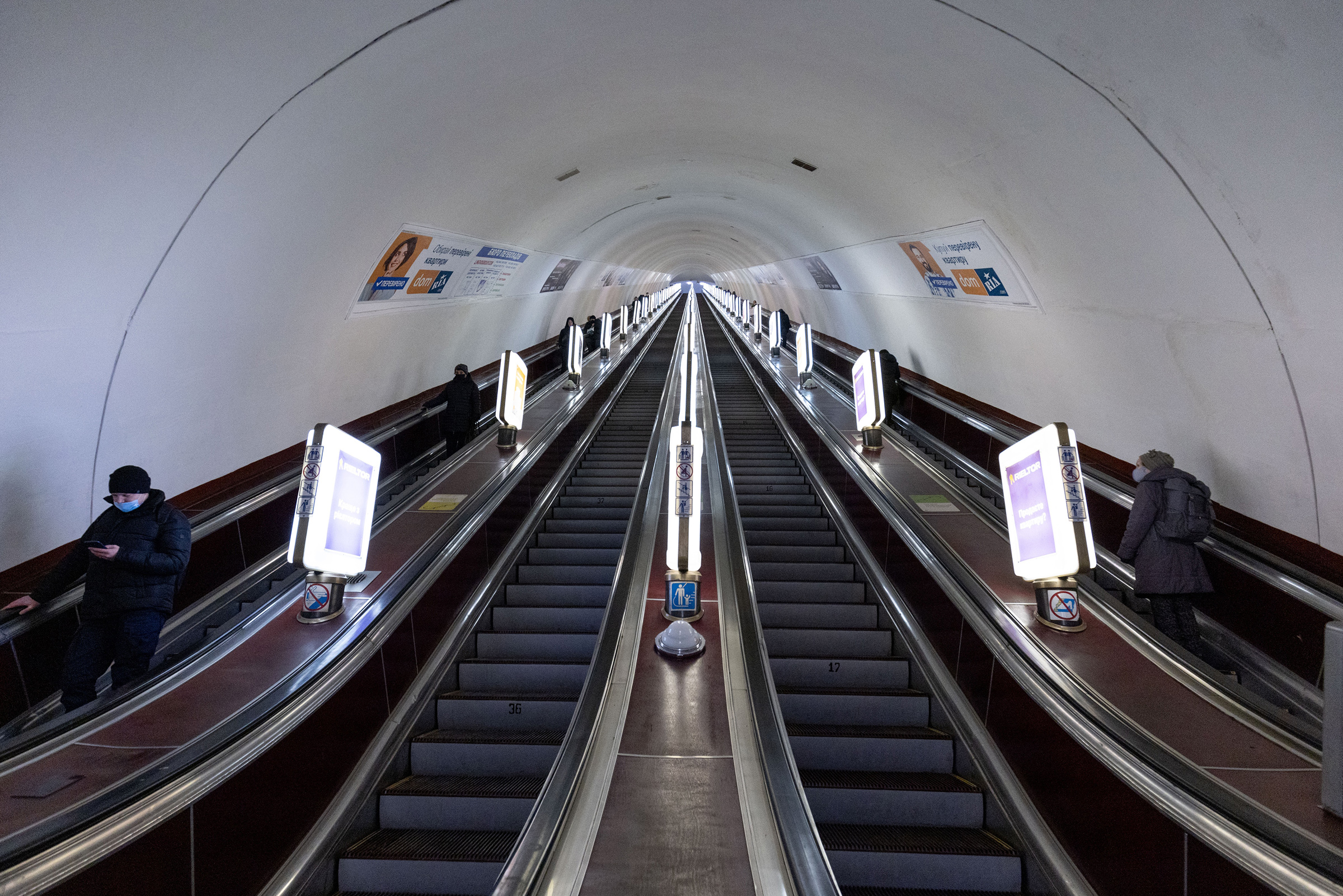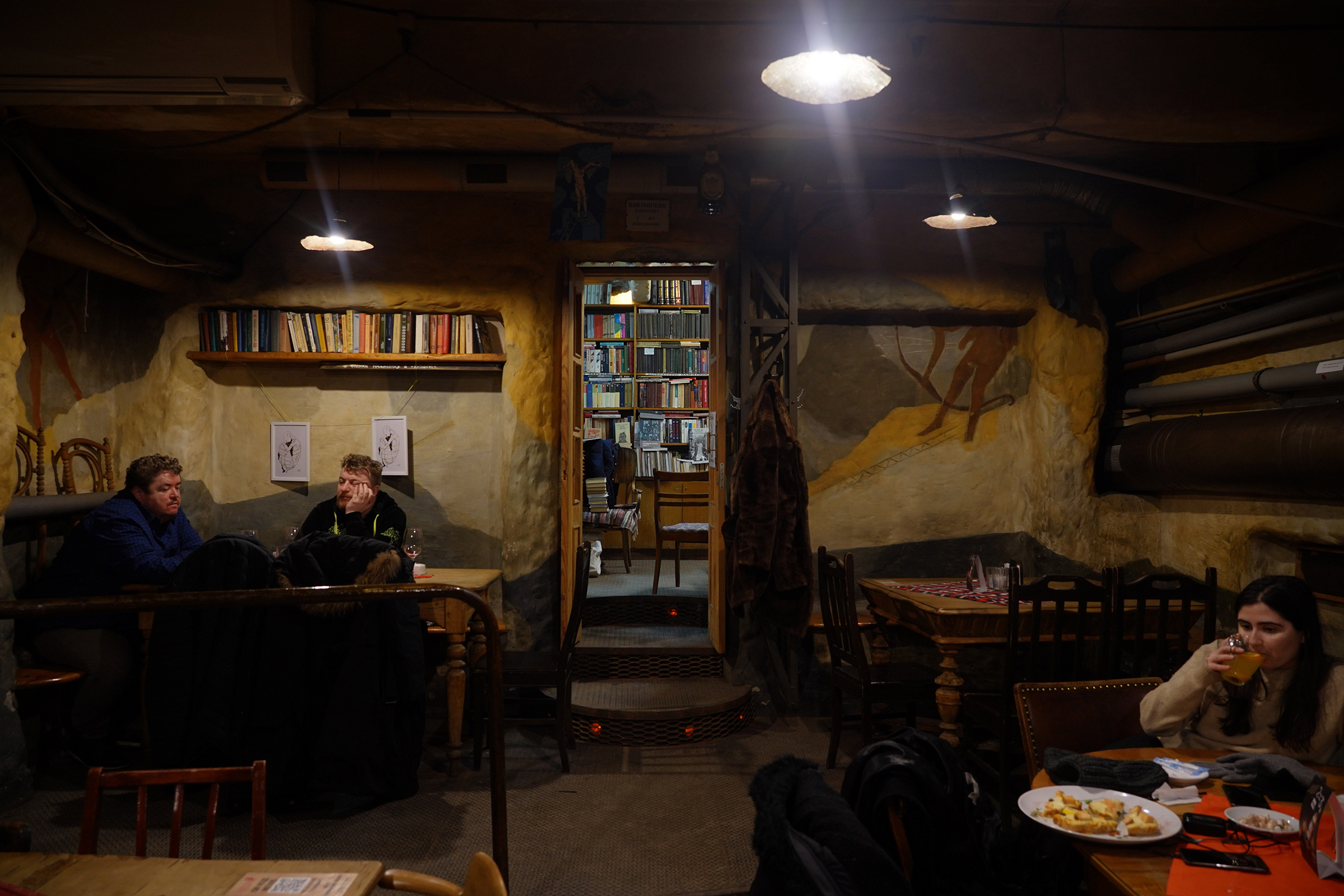For years, the Closer nightclub in the Ukrainian capital has dominated Eastern Europe’s legendary dance scene. A guest performance by a pair of celebrated American DJs—planned for Feb. 12—would have placed the Kyiv techno bar firmly on the international stage.
But when U.S. intelligence warned a day earlier of an “imminent” Russian invasion of Ukraine, The Blessed Madonna and Honey Dijon pulled out at the last minute. The nightclub’s management scrambled to replace them with an artist from Germany—who also ultimately ended up canceling. “His wife forbade him from going to Ukraine,” says Closer’s technical director Sergii Vel, sounding weary. After months of challenges because of COVID-19, he’s now facing additional difficulties because of the growing threat from Russia. Last weekend, though Closer managed to hold a smaller event with Ukrainian musicians, Vel says he could feel a darkness closing in. “Our cultural sphere is greatly suffering,” he added.

As clouds of conflict loom over this country of 40 million, many are feeling particularly deserted. While Moscow said this week that it had started withdrawing some of its 130,000 troops positioned close to Ukraine’s borders, Western countries maintain the possibility of a major Russian strike is high. Tensions ratcheted up on Friday when a car bomb exploded in Donetsk, according to Russian state media, an area where Moscow-backed separatists were evacuating people to Russia—precisely the kind of incident Secretary of State Antony Blinken warned could be used to justify a Russian invasion. And though the West has so far united in their support for Ukraine—a crisis that “directly affects every member of [the U.N. Security] Council and every country in the world”, according to Blinken on Thursday—many Ukrainians feel that the incessant talk of war is already having a disastrous impact: isolating the country on various fronts, from its cultural heritage to the economy, and working in Russia’s favor.
Read More: What the West Will Never Understand About Putin’s Ukraine Obsession
Indeed, Russian aggression against Ukraine goes beyond military and security dimensions, argues Volodymyr Sheiko, Director General of the state-run Ukrainian Institute, which promotes cultural diplomacy. “Russia seeks to destabilize Ukraine and the international community with a wider arsenal… disrupting daily routines of Ukraine’s institutions and people,” he said in written answers to questions from TIME. He added that some of the Institute’s international partners are postponing cooperation until things “settle down.”
In recent weeks, a series of cyberattacks knocked the websites of major banks, the defense ministry and Ukrainian army offline for several hours, Ukrainian authorities said in a statement, pointing a finger at Russia. Meanwhile, the Kremlin’s saber-rattling has caused the national currency, the hryvnia, to plunge to a four-year low against the dollar. Dutch airline KLM halted flying to and over Ukraine, while Germany’s Lufthansa said it is considering a suspension. Two Ukrainian airlines, including flagship carrier Ukraine International Airlines (UIA), said on Feb. 14 they were facing problems securing their insurance. Most international tourism has all but stopped.
The last two weeks have seen a flurry of embassies abandon Kyiv and the eastern city of Dnipro, some 100 miles from the front line of war in eastern Ukraine. They have decamped to Lviv in western Ukraine near the Polish border. The ever-growing list includes the United States, Canada, Australia, Germany, The Netherlands and Switzerland. American, British and Canadian military training missions have also been withdrawn to avoid any potential conflict with Russia.
President Volodymyr Zelensky, who was elected three years ago on a promise to stand up to Russia, has repeatedly appealed to Western leaders to dial down the panic, even asking President Joe Biden to visit Kyiv in order to “stabilize the situation.” Parliamentarian David Arakhamia, from Zelensky’s Servant of the People party, said the talk of war is costing the Ukrainian economy around $2-$3 billion a month. Speaking on Monday on private TV channel 1+1, he said “when someone decides to move the embassy to Lviv, they must understand that such news will cost the Ukrainian economy.”
Read More: The Untold Story of the Ukraine Crisis
A survey by the European Business Association in late January—two weeks before Washington warned that a ground invasion was near inevitable—found that 17% of over 130 member companies in Ukraine were already considering relocating to the west of the country, while 10% thought of leaving the country altogether.
Some in Moscow have openly rejoiced. “The economy in Kyiv has been torn to shreds… a small matter, but pleasant,” Margarita Simonyan, the editor in chief of the Kremlin-controlled RT television network, wrote on her Telegram channel.

Ukraine’s cultural figures and artists are especially concerned about being cut off from the world. Long viewed as key to countering a threat from its much larger neighbor, Ukraine’s arts and culture scene has undergone a revival over the past eight years. The Maidan Revolution of 2014 ultimately ousted the country’s pro-Russian leader and, while Russia annexed Crimea and war broke out in the country’s east between forces allied to Moscow and the Ukrainian government, much of Ukraine began to flourish as it embraced closer economic and cultural ties with Europe. While Russian President Vladimir Putin often describes Ukrainians and Russians as one people, Kyiv’s cultural figures reject this as propaganda aimed at robbing the country of its identity and right to self-determination.
Now, more than 1,000 members of Ukraine’s cultural, artistic and scientific community have appealed to world leaders, in an open letter released by the Ministry of Culture and Information on Feb. 13 that is still gathering signatures. “Please understand that when music is playing, a movie is being shown, or an artist is painting a picture, the roar of guns doesn’t fit,” the letter read. “Your leaders say that they are for peace—so prove it.”
The dramatic withdrawals of foreign embassy staff and warnings of imminent invasions are creating a sense of dual realities in Kyiv, where preparations for war coexist with the ordinary. Over the Valentine’s Day holiday, Kyiv’s cafes bustled with people. In clubs and bars, local comedians riffed with the audience about rising tensions. As couples strolled the scenic banks of the Dnieper river, some pausing to take a dip in the icy waters, they could hear members of the ultra-nationalist paramilitary group Right Sector stage exercises nearby. “People need to learn about bomb shelters, teach each other first aid and weapons training,” said a tattoo-covered veteran in his 30s who declined to give his name. A ferret peeked out of his front pocket. “A big war could start this time.”

“Today we don’t know what tomorrow will bring,” read a statement this week from Ukraine’s only major photography festival, held each May in the Black Sea port city of Odessa since 2015. The team was still negotiating with foreign guests, but “cannot guarantee a big international event as we ourselves are trapped in this situation.” It added that this year’s event—its first in-person since the pandemic started—would instead be smaller and “cozy.”
Activist and Ukrainian filmmaker Oleh Sentsov, who spent five years in a Russian jail before his release in a 2019 prisoner swap, says Ukraine’s culture must be preserved at all costs. On Wednesday, Sentsov’s latest film Rhino, which takes place in the criminal underworld of 1990s Ukraine, opened to a packed Kyiv movie theater. And while the acclaimed filmmaker did not even think of canceling the premiere, the theater was secured with armed men in case of what he described as “provocations”, or staged violence from Russia. “We’ve had war for eight years now,” he says. “If we do not hold concerts or make films, then nothing makes sense.”
And at the Closer nightclub, the team is appealing to the government for financial support. Vel said they will continue to invite DJs from around the world to play on its cushion-filled floors, to prevent young people from being overcome by fear and to come to Kyiv—to see “peace and love in our clubs.”
More Must-Reads from TIME
- Cybersecurity Experts Are Sounding the Alarm on DOGE
- Meet the 2025 Women of the Year
- The Harsh Truth About Disability Inclusion
- Why Do More Young Adults Have Cancer?
- Colman Domingo Leads With Radical Love
- How to Get Better at Doing Things Alone
- Michelle Zauner Stares Down the Darkness
Contact us at letters@time.com